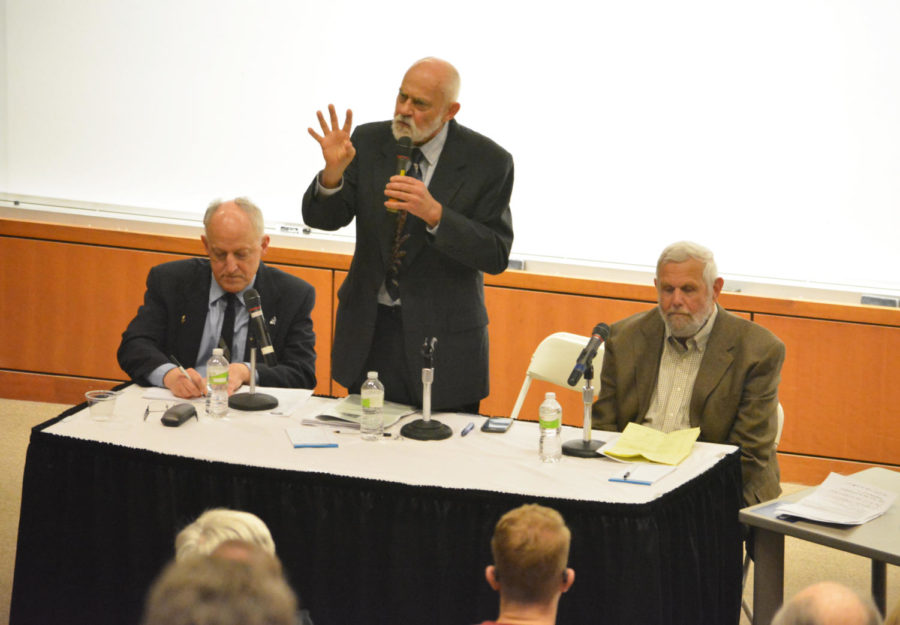Former Iowa legislators say sustainable agriculture needs to increase
Sustainable agriculture advocates, Ralph Rosenberg, David Osterberg and Paul Johnson discussed the creation of the Iowa Groundwater Protection Act of 1987 and the Leopold Center on Mar. 28 at the Gerdin Business Building
March 28, 2017
Now more than ever, we should be asking elected officials why they aren’t doing more at the state level for sustainable agriculture, Ralph Rosenberg said.
Mark Rasmussen, David Osterberg, Paul Johnson and Rosenberg spoke Tuesday about the Leopold Center for Sustainable Agriculture’s history and future for sustainable agriculture in the 21st century.
The Leopold Center focuses on new ways to farm profitably while having minimal negative environmental impact. The Leopold Center was founded as a result of the Iowa Groundwater Protection Act of 1987.
Members of the Leopold Center advisory board were present at the event. Board members advise the director on funding of policies and procedures, research funding, budget development and program review. Students and community members were also in attendance.
Rasmussen, director of the Leopold Center, moderated the lecture and briefly introduced the three panelists for the event.
Rasmussen requested that the men speak about the creation of the Groundwater Protection Act and the Leopold Center’s impact on the past and future.
“Knowing that they’re not shy of speaking, I’m just going to throw up the three questions and let them have at it,” Rasmussen said.
Rosenberg, former Iowa legislator and current executive director of the Iowa Environmental Council, addressed how the Iowa Groundwater Protection Act was passed despite low funding.
“30 years ago, the stars came together for us to pass this legislation,” Rosenberg said.
Rosenberg cited the public and media as being helpful in getting the legislation passed, as those who had the money and power to fund it were against it.
Even after the bill was passed, the men had to work for about four more years protecting it because some people were trying to dismantle it.
Rosenberg recalled one colleague of his, a Democratic senator, speaking negatively about him and asking the public why they would elect someone who would create the Groundwater Protection Act and Leopold Center, stating that they were bad. Rosenberg now sees it as a badge of honor to have worked on the bill despite the pressure during its creation in the ’80s.
“A sustainable agriculture program is good business,” Rosenberg said. “It’s good business, it’s good for agriculture and it’s good for Iowa.”
Osterberg, former Iowa legislator and current clinical professor at the University of Iowa, stood and spoke about what has been achieved since the bill was passed.
Osterberg referred to research at the institutional level as “regular agriculture” as opposed to what it was called years ago, “alternative agriculture.”
Sustainable agriculture research is becoming a priority, yet, the Supreme Court of Iowa is preempting people from making changes at the county level, Osterberg said.
“We have great research at the Leopold [Center],” Osterberg said. “We also have a program here in sustainable agriculture where somebody can get a master’s, maybe a Ph.D. in that. There are a number of great people who come out of that. Good work is going on.”
Despite this major, Osterberg thinks that we need to get people to want to go beyond research and get people to want to adapt it.
Johnson, former Iowa legislator and current member of the Sustainable Iowa Land Trust advisory board, spoke about why the bill was necessary.
“We were in the middle of a really serious farm crisis,” Johnson said. “Ground water pollution was really becoming an issue. Every week you’d see something in the paper in Iowa about high nitrate levels.”
Around the time of the Iowa Groundwater Protection Act the Iowa Department of Natural Resources was also created to protect Iowa’s natural environment.
The Leopold Center was created at Iowa State to give license to faculty and students for agricultural research.
After getting the Iowa Groundwater Protection Act passed, Rosenberg called Johnson to tell him that their fight was not over. A meeting was set with then-Iowa State President Gordon Eaton to discuss what the Leopold Center was created to establish.
For the future, Johnson would like to see an annual conference on an issue dealing with sustainability that would eventually become a national conference with people attending from all over the world to discuss the best practices for having a sustainable environment.
“We’ve got a long way to go,” Johnson said. “I think we’ve done a lot in 30 years, but there’s an awful lot left to do. I think the Leopold Center has quite a challenge ahead of it, but we look forward to it.”







